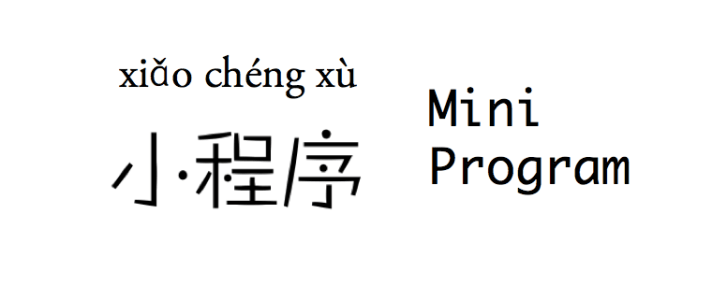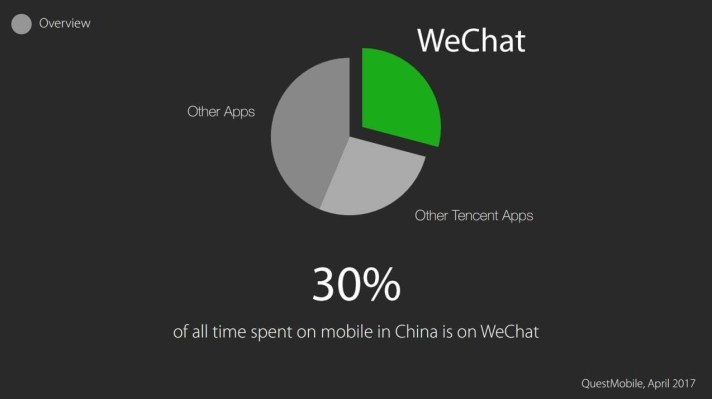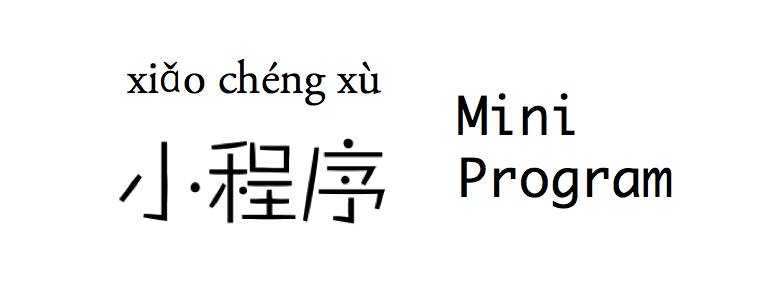The man who built WeChat, China’s No.1 communication tool with 877 million daily users, rarely appears in public. The 47-year-old Allen Zhang (Zhang Xiaolong) is a low-profile, chain-smoking, and hardcore programmer who prefers to let his product speak for itself. However, last December, WeChat held its own version of the WWDC in Guangzhou, where Zhang made a rare appearance, giving a long speech explaining a new WeChat feature called mini-programs‚ lightweight apps that live within WeChat (The English documentation of WeChat Mini Program made its debut this month).
 When mini-programs were first released in January, it was labeled by the media as “revolutionizing” and “app-killing.” But many early interpretations of the mini-program have misunderstood its purpose. To truly understand what Tencent wants to achieve with mini-programs, we need to go back to the man’s own words. Here are four main insights from Zhang’s speech in December that are key to understanding the WeChat team’s thinking behind the mini-program.
When mini-programs were first released in January, it was labeled by the media as “revolutionizing” and “app-killing.” But many early interpretations of the mini-program have misunderstood its purpose. To truly understand what Tencent wants to achieve with mini-programs, we need to go back to the man’s own words. Here are four main insights from Zhang’s speech in December that are key to understanding the WeChat team’s thinking behind the mini-program.
1. WeChat is a tool, not a platform
As much as they are similar, tools and platforms are not the same thing, and their successes should be measured differently. A good tool wants efficiency and intuitiveness; a good platform wants engagement and active users. “I think WeChat is a tool, and I don’t think tools should be undervalued. Making a good tool is a very difficult and ambitious project. It was the ability to make tools that allowed humans to evolve from its primitive state to the modern state. If WeChat was a platform, I would have no idea what to do with it,” Zhang said.
If WeChat is a tool not a platform, then users should spend as little time on it as possible. Unlike other product managers who often talks about the “stickiness” of an app, Zhang and the WeChat team do not see the amount of time the average user spends on the app as a measure for success. (Over half of WeChat users spend 1.5 hours on the app each day.) In fact, quite the contrary, he defines success as having users spend less time on WeChat. “A good tool is something that you visit and leaves instantly,” he emphasized multiple times during the speech. It should allow you to achieve your goal efficiently, without any time wasted on finding features or being distracted by irrelevant information. The measure of success is how much users get done, not how much time they spend.

2. Apps are unnatural
Zhang sees installing and uninstalling an app as an unnatural and inconvenient process. Mini-programs do not need to be installed or uninstalled. They are like webpages that you access ad hoc, and do not take up memory space on your phone.
For example, when you go into a restaurant and want to join the queue or order dishes, you wouldn’t need to download the restaurant’s app—all you need is to scan a QR code and load its mini-program. After the meal, the mini-program is cleared from your phone, as if you never used it (a visit history appears in the mini-program tab but you can easily delete it by one finger swipe).
Zhang’s dislike for apps has to do with his thesis about the future of technology. “After the PC age and the mobile age, I think the next stage could be a ‘smart glasses’ age. We would be able to see a giant screen that is projected directly to our retina. I hope that these glasses will not require the installation of apps, because that process is unnatural and inconvenient. Wherever my eyes fall, the relevant program should be right there, ready for use. You get it by seeing it,” he predicted.
3. The entrance (to services) in the PC age is the search bar; the entrance in the mobile age is the QR code
Most people’s first impression of mini-program is that they are hard to find. It only appears in your “Discover” tab after you actually enter a mini-program, and you can only enter one through scanning a physical QR code or searching for the program’s exact name (it doesn’t support vague searching). The search function is limited deliberately to “prevent misuse,” Zhang said. So, unless you had a specific mini-program in mind that you wanted to use, you may never realize that there is such a thing called WeChat mini-programs.
Zhang said he does not want a central marketplace for mini-programs in the vein of an App Store, or even a landing page where you can browse mini-programs. Most WeChat products follow the principle of “decentralization.” He prefers mini-programs to be accessed through the user’s own initiative—through scanning a QR code, or searching a name. There would be no ranking, categorization or recommendation of mini-programs on WeChat.
Why the QR code? Fundamentally, mini-programs are designed for offline scenarios, like scanning QR code at a bus stop to see when the next bus is coming or to buy a ticket. When people want to obtain service, QR code scanning is the easiest way to connect the offline to the online. “Sao yi sao”ing with your phone is central to many WeChat functions, from adding a friend to following an organization’s official WeChat account.
“This a good thing, because when there is no central entrance [to mini-programs] in WeChat, the businesses with WeChat accounts will need to put their QR codes everywhere, and there is no need to jostle one another for top positions on our ‘ranking,’” he said.
Another thesis of Zhang’s is that “the smartphone should be an extension of our bodies.” WeChat differs from Western messaging apps in that its functions are tailored to the small, intimate, handheld nature of mobile phones, whether it’s “sao yi sao” (scanning a QR code) or shaking your phone (to find people nearby who are also shaking their phones). These are features that were impossible during the PC age and take maximum advantage of the mobile age.
4. The user of the mini-program is considered a visitor, not a follower
Within mini-programs, businesses are usually not allowed to send messages or advertisements to users. The user needs to take the initiative to visit the mini-program. The initiative is on the user’s side, not the program’s side. “The user wants to get the service, not push notifications. This is the mission of mini-programs,” he said. A good tool is unintrusive and doesn’t disturb or distract the user. Tencent’s official mantra is “We aim to create value for our users.”
Thus, mini-programs are not ideal for content providers, like media outlets. These are better served by another WeChat feature, WeChat official accounts, which users can subscribe to and receive article notifications from.
———————
This is the video of Zhang’s full speech, posted on Tencent University’s website (here’s the full transcript in Chinese if you don’t have 1.5 hours to watch the video).
I write a weekly email newsletter on tech trends in China, and co-host a podcast on US-China cross-border tech. Subscribe and listen at 996.ggvc.com.

2 thoughts on “4 Philosophies Underlying the WeChat Mini-Program – Lessons from the Father of WeChat”